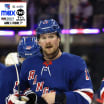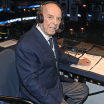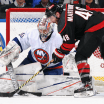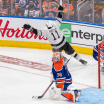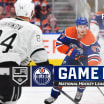Legendary hockey reporter Stan Fischler writes a weekly scrapbook for NHL.com. Fischler, known as "The Hockey Maven," shares his humor and insight with readers each Wednesday.
This week, Stan presents a list of five forwards currently not in the Hockey Hall of Fame but who he believes rate consideration based on their accomplishments. They are listed alphabetically.
Goring among forwards worthy of Hall of Fame consideration
Mogilny, Nicholls, Provost also merit another look, Fischler says
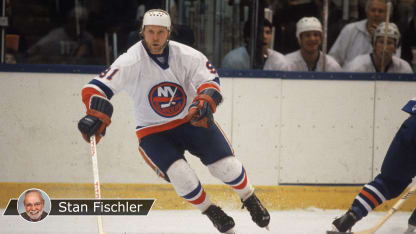
By
Stan Fischler
Special to NHL.com
Butch Goring
Could the New York Islanders have won four consecutive Stanley Cup championships (1980-83) without Goring? We'll never know.
What we do know is that as the 1980 NHL Trade Deadline approached, Islanders general manager Bill Torrey felt he was missing one key player.
"I needed a guy to take the pressure off Bryan Trottier," Torrey said. "When I dealt (forward) Billy Harris and (defenseman) Dave Lewis to the (Los Angeles) Kings in March 1980, I got my man: Goring."
He was right. Goring was the missing piece, fitting in perfectly as New York's No. 2 center and helping the Islanders win four straight championships and 19 consecutive playoff series, a record that may never be broken. In addition to his offensive abilities, Goring was a splendid penalty-killer; in 1981, he was voted winner of the Conn Smythe Trophy as MVP of the Stanley Cup Playoffs as much for his defensive play as his offensive contributions (10 goals and 20 points in 18 games).
Ron Wicks, who spent a quarter-century as an NHL referee, called Goring "the heart and soul" of the Islanders.
Prior to the trade, Goring had nine consecutive 20-goal seasons for the Kings and established himself as a top two-way player. He finished his NHL career with 888 points (375 goals, 513 assists) in 1,107 regular-season games and 88 points (38 goals, 50 assists) in 134 postseason games.
Phil Goyette
Author Kris Kullas once called Goyette "arguably the greatest third-line center ever to play in the NHL." Though he might have been a No. 1 center on other teams, Goyette was limited to a third-line role with the Montreal Canadiens because the centers ahead of him were future Hockey Hall of Famers Henri Richard and Jean Beliveau.
"Phil was a terrific depth player," said Danny Gallivan, the legendary broadcaster. "Once Beliveau was out with injury and Goyette replaced him. In his first game in Jean's spot, Phil got three goals."
Goyette joined the Canadiens in 1956-57 and helped them win the Cup in each of his first four seasons. He was an outstanding two-way forward, and not only in Montreal.
The Canadiens traded him to the New York Rangers on June 4, 1963 and he scored 65 points (24 goals, 41 assists) in his first season with his new team. Goyette had consecutive 60-point seasons for the Rangers in 1966-67 and 1967-68 and then set NHL career highs in goals (29) and points (78) in 1969-70 after being traded to the St. Louis Blues, when he won the Lady Byng Trophy for skillful and gentlemanly play.
Goyette played for the Buffalo Sabres before he returned to the Rangers in 1972 and helped them reach the Stanley Cup Final.
He scored 674 points (207 goals, 467 assists) in 940 NHL regular-season games, and 46 points (17 goals, 29 assists) in 94 postseason games.
Alexander Mogilny
The speedy right wing was the first top-flight player to defect from the Soviet Union (at the 1989 IIHF World Championship in Stockholm, Sweden) and play in the NHL. He joined the Buffalo Sabres for the 1989-90 season, scored 30 goals in 1990-91, 39 in 1992 and tied for the NHL lead (with Teemu Selanne) by scoring 76 goals in 1992-93, when he teamed with future Hall of Famer Pat LaFontaine to form one of the most dangerous forward pairings in the League.
On July 8, 1995, the Sabres traded Mogilny to the Vancouver Canucks, where he was reunited with Pavel Bure, his junior linemate in the Soviet Union. Mogilny scored 55 goals and 107 points in 1995-96, his first season with Vancouver, and 308 points (139 goals, 169 assists) in 312 games with the Canucks before being traded to the New Jersey Devils on March 14, 2000.
Mogilny helped the Devils win the Stanley Cup in 2000 and reach Game 7 of the Cup Final in 2001 after scoring 43 goals during the regular season. He signed as a free agent with the Toronto Maple Leafs in the summer of 2001 and scored 24 and 33 goals in his first two seasons, helping Toronto reach the Stanley Cup Playoffs each season.
He scored 30 or more goals eight times in 16 NHL seasons and finished with 1,032 points (473 goals, 559 assists) in 990 regular-season games.
Bernie Nicholls
Hockey historian Andrew Podnieks called Nicholls "a great scorer with quick hands and a dynamite shot." He was right.
Nicholls scored 20 goals or more 11 times in 18 NHL season, including an NHL career-high 70 goals and 150 points for the Los Angeles Kings in 1988-89. He's one of eight players in NHL history to score at least 70 goals in a season, one of five to score at least 150 points and one of four to do both.
The center had scored 75 points (27 goals, 48 assists) in 47 games for the Kings prior to the 1990 All-Star break, when he was traded to the New York Rangers. He didn't miss a beat with his new team, scoring 37 points (12 goals, 25 assists) in 32 games to help New York finish first in its division for the first time since 1941-42. Nicholls also scored seven goals and 12 points in 10 playoff games that season.
The Rangers traded him to the Edmonton Oilers on Oct. 4, 1991, as part of the package that brought Mark Messier to New York. Nicholls also played for the New Jersey Devils, Chicago Blackhawks and San Jose Sharks before retiring in 1999 with 1,209 points (475 goals, 734 assists) in 1,127 regular-season games, an average of 1.07 points per game. He also scored 114 points (42 goals, 72 assists) in 118 playoff games.
Claude Provost
Provost has few equals in NHL history as a defensive forward. It was a role he excelled at throughout his 15 seasons with the Montreal Canadiens.
"Claude blanketed our Bobby Hull whenever we played Montreal," said Hall of Fame goalie Glenn Hall, Hull's longtime teammate with the Chicago Blackhawks.
Provost's play as a shutdown forward helped Montreal win five consecutive Stanley Cup championships from 1956-60 and four in a span of five seasons from 1964-65 through 1968-69.
Provost scored 50 points five times and was an NHL First-Team All-Star in 1964-65, when he scored 27 goals and 64 points in 70 games. He also led the Canadiens with an NHL career-high 33 goals in 1961-62.
In 1,005 regular-season games, Provost scored 589 points (254 goals, 335 assists). He also scored 63 points (25 goals, 38 assists) in 126 playoff games.
In 1967-68, Provost's sportsmanship, perseverance and dedication to hockey were recognized when he was named the first winner of the Masterton Trophy.


